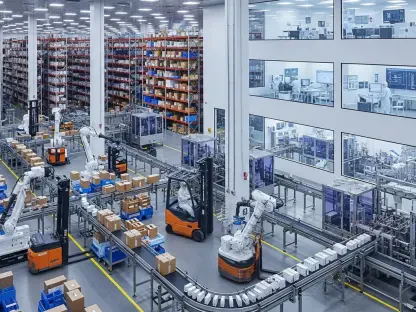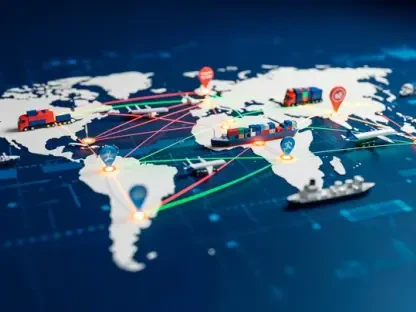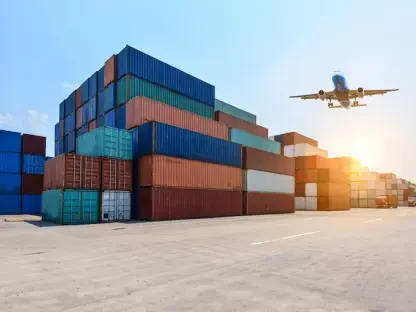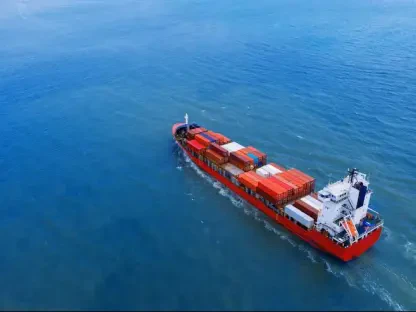Mahindra Logistics Limited has taken a significant step towards sustainability with the launch of its ‘Emission Analytics Report’ on August 21, 2024. This advanced software platform empowers businesses to monitor and reduce their carbon emissions, particularly in the transportation segment, thereby aiding in the global effort to combat climate change. By providing a real-time visualization tool for tracking carbon emissions, the platform offers detailed insights into various metrics, such as emission intensity, tonne-kilometers, mode-specific emissions, and fuel usage, enabling businesses to make immediate and impactful decisions. This timely action can lead to the optimization of logistics operations, significantly helping companies to lower their carbon footprints.
The inclusion of Scope 3 carbon emission data in the Emission Analytics Report ensures that businesses gain a comprehensive understanding of the entire supply chain’s carbon impact. Scope 3 emissions contain all indirect emissions within a company’s value chain, including everything from raw material extraction to product delivery to the end consumer. Addressing these emissions is essential for businesses eager to meet net-zero targets. Additionally, the platform offers access to emissions savings certificates, adding a financial and reputational incentive for companies to seriously pursue decarbonization efforts. These incentives align with broader corporate sustainability goals and compliance requirements, making them a strategic priority for modern businesses.
Real-Time Carbon Emissions Tracking
One of the standout features of the Emission Analytics Report is its real-time carbon emission tracking capability. This tool allows businesses to visualize their carbon emissions instantly, enabling them to take immediate action. By offering detailed insights on emission intensity, tonne-kilometers, mode-specific emissions, and fuel usage, companies can pinpoint specific areas where improvements are needed. The real-time aspect not only helps in instant decision-making but also paves the way for ongoing optimization of logistics operations. Companies can continually refine their logistics processes to achieve incremental sustainability gains, making real-time tracking a vital component in their environmental strategies.
Moreover, the inclusion of Scope 3 carbon emission data ensures a comprehensive understanding of the entire supply chain’s carbon footprint. Scope 3 emissions include all indirect emissions that occur in a company’s value chain, which is crucial for businesses aiming to achieve net-zero emissions. The platform also provides access to emissions savings certificates, adding another incentive for companies to take their decarbonization efforts seriously. Such certificates can be used as part of broader sustainability marketing efforts, helping companies communicate their commitment to environmental stewardship to both stakeholders and customers.
Subscription-Based, User-Friendly Platform
The Emission Analytics Report operates on a subscription-based model, making it accessible to a wide range of businesses. By offering monthly insights into users’ carbon footprints, the platform ensures that companies stay informed about their environmental impact over time. This subscription model also means that businesses can scale their usage of the platform based on their needs, allowing for more flexible and adaptive sustainability strategies. The ability to adapt and scale is crucial in a dynamic business environment, where sustainability goals and regulatory requirements may evolve.
Designed for ease of use, the platform is available both on web and mobile, ensuring seamless integration into existing systems. This user-friendly approach means that companies can quickly adopt the platform without the need for extensive training or infrastructure changes. Being built on a Software as a Service (SaaS) model, it offers the advantages of scalability, reliability, and continuous updates, ensuring that users always have access to the latest features and data. The SaaS model also eliminates the need for significant upfront capital investment, making it an attractive option for businesses of all sizes.
Comprehensive Green Logistics Ecosystem
The introduction of the Emission Analytics Report is part of Mahindra Logistics’ broader green logistics ecosystem. Initially launched with the Edel green last-mile cargo delivery service, this ecosystem has since evolved to include a variety of sustainable solutions. These include carbon-neutral warehousing and a fleet of electric vehicles (2W, 3W, and 4W) for last-mile delivery. By providing an integrated suite of green logistics solutions, Mahindra Logistics allows companies to tackle their carbon emissions on multiple fronts. The synergy between these various sustainability initiatives maximizes their collective impact, setting a high standard for the logistics industry.
This comprehensive suite of solutions means that businesses can tackle their carbon emissions on multiple fronts. For example, by using electric vehicles for last-mile deliveries, companies can significantly reduce their reliance on fossil fuels. Additionally, carbon-neutral warehousing ensures that emissions from storage operations are minimized, contributing further to overall sustainability goals. These solutions not only help reduce environmental impact but also offer potential cost savings through improved efficiency and reduced reliance on traditional fuel sources. Collectively, they represent a bold and forward-thinking approach to sustainable logistics.
Meeting Regulatory and Corporate Sustainability Goals
The Emission Analytics Report also plays a crucial role in helping businesses comply with regulatory requirements such as the Business Responsibility and Sustainability Reporting (BRSR) standards. With stringent environmental regulations becoming the norm, companies that fail to meet these standards risk not only financial penalties but also reputational damage. The platform’s robust reporting features ensure that businesses can easily meet these regulatory requirements. This is particularly important in an era where stakeholders and customers alike are prioritizing sustainability, demanding more transparency and accountability from the companies they engage with.
Furthermore, for companies aiming to enhance their corporate sustainability efforts, this tool offers invaluable insights and data-driven strategies. By providing shipment-level reporting of Scope 3 emissions across various industries including automotive, manufacturing, consumer goods, and more, the platform caters to a wide array of business needs. This specialized focus helps businesses tailor their sustainability efforts to their specific industry contexts, making their strategies more effective. It also provides a competitive edge in sectors increasingly driven by sustainability metrics, helping companies not only comply with existing regulations but also anticipate future ones.
Industry-Wide Implications and Future Vision
Mahindra Logistics Limited advanced its commitment to sustainability with the introduction of its ‘Emission Analytics Report’ on August 21, 2024. This innovative software platform empowers businesses to monitor and reduce carbon emissions, especially in the transportation sector, contributing to the global fight against climate change. The platform provides real-time visualization for tracking emissions, delivering deep insights into various metrics like emission intensity, tonne-kilometers, mode-specific emissions, and fuel usage. This enables businesses to make swift, impactful decisions, optimizing logistics and significantly lowering their carbon footprints.
Crucially, the platform includes Scope 3 carbon emission data, giving a holistic view of the entire supply chain’s carbon impact. Scope 3 emissions cover all indirect emissions within a company’s value chain, from raw material extraction to product delivery. Tackling these emissions is vital for businesses aiming to achieve net-zero targets. Additionally, the Emission Analytics Report offers access to emissions savings certificates, providing both financial and reputational incentives. These incentives align with corporate sustainability goals and compliance standards, making them a strategic priority for contemporary businesses.









